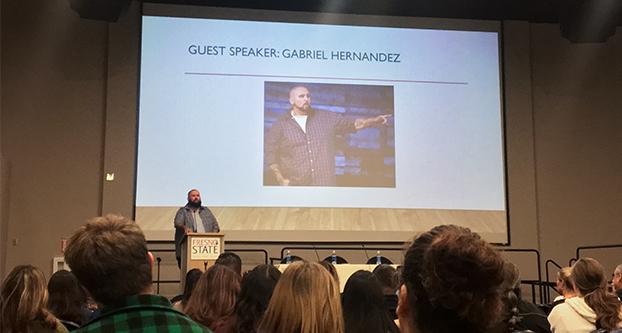Fresno State’s Alpha Phi Sigma chapter and Project Rebound gave a warm welcome Tuesday night to Gabriel Hernandez, a pastor who speaks about his past as a gang member to help mentor at-risk youth.
Once a native of Fresno, Hernandez shared his struggle with substance abuse, criminal offenses and his involvement in the East Side Fresno Bulldog Gang. The road to recovery did not go without difficulty or remorse.
“I’m absolutely ashamed of the crimes I’ve committed against other people and moreso I’m ashamed about what I did to hurt my family members,” Hernandez said.
He mentioned the unconditional support from his mother even at times he felt it was undeserved.
“If I ever got in trouble my mom was always there to clean everything up,” Hernandez said. “She stuck her neck out way too many times when I should’ve been busted.”
After a few times in jail, Hernandez described his way of “playing the system” to visit fellow gang members incarcerated. But it was an attempted carjacking that threatened to place Hernandez behind bars for good.
“I remember when I was sitting down, my public defender comes in and says you’re looking at like 75 years,” Hernandez said. “I remember my knees getting weak and wanting to hit the ground. [I was thinking] man I just wanted to go visit prison, I didn’t want to live there.”
It’s been 11 years since Hernandez was released. He now uses his knowledge to help at-risk youth from leading the same path he did.
“I remember when I got released it just became part of my resume as I introduced myself [saying] yeah I just got out,” Hernandez said. “I work with a lot of at-risk teens now and I see them regurgitate that same nonsense. I want to get so angry at the ignorance that they have, but I’m as guilty as they are.”
Primarily, Hernandez reminds his youth groups of the obstacles faced by those with an incarceration stamp on their track record. Following the lecture, Project Rebound hosted a Q&A with audience members to provide further information about the program.
Project Rebound is designed to help formerly incarcerated students matriculate through the university system.
“A lot of individuals who come home from long incarceration periods have unique challenges such as never having held a cellphone,” said Jennifer Leahy, the program coordinator for Project Rebound at Fresno State.
For Leahy, the goal of the organization is to provide a support network for students looking to change the trajectory of their lives which may create a ripple effect impact others in their communities.
“These individuals have moved on out into the community to become very powerful and influential individuals and a positive change in their communities,” Leahy said. “Which supports all of the research in respect to education having a positive impact, reducing recidivism, reducing victimization and helping to empower individuals to change their lives for the good.”
Project Rebound was established in the late ‘60s by Dr. John Irwin, a professor of sociology at San Francisco State University. As a formerly incarcerated individual, Irwin witnessed obstacles faced by those aiming to change the trajectory of their lives post-incarceration.
Seven CSUs have implemented the program alongside San Francisco State. CSU Los Angeles also follows the program, though they do not receive funding, for a total of nine campuses practicing statewide.
“There’s a lot of resistance and condemnation and negative stereotyping that is associated with ex-felons and ex-offenders,” Leahy said. “There’s a lot of fear in revealing that to individuals which creates a sense of isolation. So part of what this program does is help on a realistic level, helping them attain their goals academically.”
For students like Sergio Coronel, a junior double majoring in history and criminology, Project Rebound has been a positive resource in redirecting his life.
“It’s a vibrant environment being around other people that are now seeking to redeem themselves of their past mistakes so I see this as a great opportunity for anybody,” Coronel said. “This program is really in a sense revolutionary in providing anybody with a background an opportunity,” he said.
Coronel was introduced to the program by a professor in his first semester at Fresno State. With the weight of his past on his shoulders, he shared that he felt very much alone on campus.
Coronel expressed his desire to utilize the Project Rebound’s services to grow in addition to becoming an activist for those struggling with gang affiliation in his community as a juvenile parole officer by sharing his own experience with gang involvement.
“This is my purpose, to finish here with a certain set of skills and to go out there in the field and implement them,” Coronel said.
For Coronel, Hernandez’s guest lecture provides an opportunity for students in the criminal justice field to hear a true testimony.
“In a way it helps them with their career goals, listening and understanding that not everyone who is incarcerated goes the same path of being a criminal as a full-time career,” Coronel said. “It opens a different door for rehabilitation approach.”
Students interested in Project Rebound can visit McLane 187 for additional information and support.





